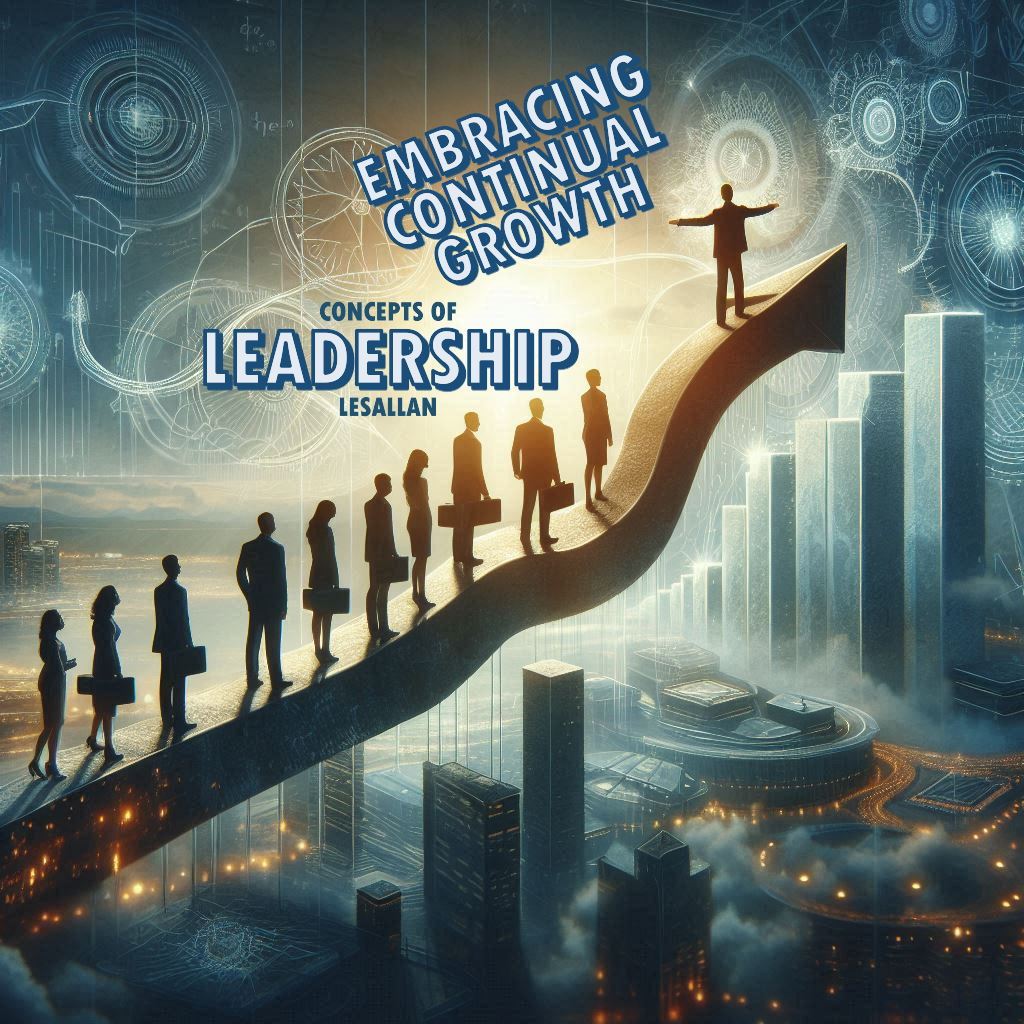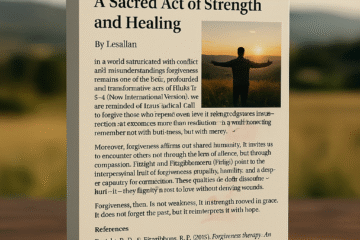Written By Lesallan | Published on February 15, 2025
Ohio Christian University
LDR3100 Concepts of Leadership (ONL25SP1)
Dr. James Leak
February 15, 2025

Embracing Continuous Growth: A Reflection on Christian Leadership Development
Leadership is an essential skill that demands ongoing growth and deliberate cultivation. This reflection paper endeavors to weave together the diverse elements of leadership explored throughout the course, translating theory into personal application. The primary aim of this final assignment is to lay the groundwork for a sustained journey of growth in Christian leadership. It is imperative to understand that leadership development should be seamlessly integrated into the daily responsibilities of a leader. Each day presents a unique opportunity to intentionally practice, refine, and elevate leadership skills, fostering an environment where both personal and communal growth can thrive (govleaders.org, 2014). By embracing this continuous learning process, leaders can manifest their values and influence others more effectively, contributing to the greater good.
As a leader, I have cultivated a range of strengths that significantly enhance my effectiveness in guiding and inspiring my team to achieve our collective goals. One of my core strengths is my communication skills, which I consider to be a vital element of effective leadership. I passionately believe that fostering an environment of clear and open dialogue is essential for promoting collaboration and innovation within the team. By actively listening to my team members and conveying my ideas in a clear and engaging manner, I foster an environment where everyone feels valued and empowered to express their thoughts and ideas. This open communication not only enhances morale but also promotes a sense of ownership and responsibility among team members. Moreover, it lays the groundwork for collective problem-solving and creativity, allowing us to harness diverse viewpoints and drive innovation. In this way, I strive to create a dynamic and inclusive team culture that not only meets challenges head-on but also thrives on shared insights and collaborative efforts (Blanchard & Hall, 2010).
Empathy is a cornerstone of my leadership philosophy, serving as a vital strength that shapes my interactions with team members. By genuinely understanding and relating to their diverse needs and concerns, I can foster a supportive and inclusive environment where everyone feels valued and heard. This ability to put myself in their shoes allows me to connect on a deeper emotional level, creating trusting relationships that are essential for effective teamwork. When individuals feel understood and appreciated, it not only enhances their individual performance but also cultivates a sense of belonging within the team. This emotional connection significantly strengthens team cohesion, empowering us to collaborate more effectively and innovate together. Such an environment leads to improved overall outcomes, as motivated team members are more likely to contribute their best efforts toward shared goals.
I take considerable pride in my decision-making skills, which I consider essential for navigating challenging situations effectively. My approach to decision-making is systematic and comprehensive; I strive to evaluate multiple perspectives and gather all relevant information before arriving at a conclusion. In high-pressure scenarios, I make a concerted effort to maintain composure and focus. This ability not only allows me to make sound judgments but also ensures that my decisions align with both immediate objectives and overarching strategic goals (Gilovich & Medvec, 1994). By navigating complexities with clarity and confidence, I reinforce my team’s trust in my leadership capabilities. This fosters a resilient organizational culture where team members feel empowered to share their ideas and solutions, knowing they are part of a supportive and thoughtful decision-making process. My commitment to fostering an environment of open dialogue and critical thinking not only enhances our collective effectiveness but also strengthens our ability to adapt and thrive in an ever-evolving landscape.
In summary, my strengths lie in communication, empathy, and decision-making, which together enhance my effectiveness as a leader. My ability to communicate clearly and transparently fosters an open environment where team members feel valued and heard. By actively listening to their concerns and ideas, I nurture a sense of trust and collaboration within the team. Additionally, my empathy allows me to understand the diverse perspectives and challenges faced by everyone, enabling me to offer support tailored to their needs. This compassionate approach not only motivates my team but also encourages them to contribute their best efforts. Furthermore, my decisive nature ensures that we can navigate challenges and seize opportunities promptly, keeping us aligned with our shared objectives. These qualities empower me to inspire, support, and guide my team effectively as we strive to achieve our goals together.
I recognize that there are several areas in which I can enhance my performance. One significant weakness I face is time management, which often hinders my ability to prioritize tasks effectively and meet deadlines consistently (Landry, 2018). This challenge can lead to unnecessary stress and a feeling of being overwhelmed, as I find myself juggling multiple responsibilities without a clear plan. Another area for improvement is my tendency to struggle with delegation. I often take on too much responsibility instead of empowering my team members to own their roles (Maxwell, 2011). This not only limits my own productivity but also prevents others from developing their skills and contributing fully. By working on these aspects, I can foster a more efficient and collaborative work environment while also supporting my personal growth.
According to John Maxwell’s Five Levels of Leadership, I am currently positioned at Level 2, which is characterized as the Permission level. At this stage, my followers choose to support my leadership willingly, motivated by genuine trust and respect rather than obligation or hierarchy (Maxwell, 2011). I have invested considerable time and effort into nurturing strong relationships, fostering an environment where open communication and collaboration thrive. While I value this foundation, I recognize that there is potential for growth, and I am committed to advancing to higher levels of leadership. My goal is to enhance my skills further, embrace new challenges, and cultivate an influence that not only inspires those around me but also leaves a lasting impact on the organization and community. By focusing on personal development and actively seeking feedback, I aim to transition to the next level, where I can empower others and contribute to their growth as well.
To enhance my leadership abilities, I have established a comprehensive set of clear and actionable goals designed to significantly boost my growth and effectiveness as a leader. First, I intend to elevate my public speaking skills to ensure I can communicate more effectively with larger audiences. This journey involves not only mastering my delivery but also building my confidence and engaging my listeners through the art of storytelling and interactive techniques. To achieve this, I plan to actively participate in workshops, join speaking clubs, and seek out various speaking opportunities, all with the aim of becoming a more persuasive and impactful communicator.
Alongside my commitment to personal skill development, I prioritize fostering a culture of collaboration within my team. This is essential for creating a cohesive and highly productive work environment. To achieve this, I will actively promote open communication channels that encourage team members to express their ideas and opinions freely. By valuing and incorporating diverse perspectives, I aim to cultivate an atmosphere where creativity can thrive. To enhance our teamwork, I will organize regular team-building activities and hold consistent feedback sessions, ensuring that each team member feels valued, heard, and empowered to contribute to our shared success. Through these initiatives, I hope to inspire my team and promote a shared sense of purpose, driving our performance and achieving our goals together.
In addition to my ongoing professional development, I am committed to refining my time management strategies to significantly enhance productivity and ensure that I prioritize tasks with greater efficiency. To achieve this, I will set specific, measurable goals and break down larger projects into smaller, manageable tasks that can be tackled systematically. Utilizing digital tools to monitor my progress will not only help me stay on track but also allow me to maintain a heightened level of focus and effectively combat procrastination.
Moreover, I recognize that improving my delegation skills is crucial for empowering my team and fostering a collaborative environment. By carefully assessing the individual strengths and capabilities of each team member, I can delegate tasks that not only align with their skills but also provide opportunities for professional growth. This targeted approach will not only distribute responsibilities more evenly but also enhance the overall team dynamic.
To facilitate this process, I plan to implement a structured framework for delegation that includes clear expectations, ongoing support, and regular follow-ups. This will ensure that team members feel both accountable for their contributions and supported in their roles, creating a sense of ownership and empowerment.
By dedicating myself to these goals, I am confident that I can elevate my leadership capabilities, which will benefit not only my personal growth but also the development of my team and the organization. These objectives are essential as they directly address my areas for improvement while simultaneously building on my existing strengths, laying a solid foundation for continued success.
To achieve my personal and professional development goals, I have outlined several specific actions that I will implement. First, to enhance my public speaking skills, I plan to actively participate in workshops and seminars dedicated to effective communication. By consistently practicing in front of diverse audiences, I aim to build both my confidence and proficiency. Engaging in public speaking forums and seeking constructive feedback will also be pivotal in honing my abilities (Capture Your Flag, 2014).
In addition, to foster better team collaboration, I will take the initiative to organize a variety of team-building activities. These activities will not only strengthen interpersonal relationships within the team but also encourage open dialogue, allowing everyone to voice their ideas and concerns freely. By promoting an inclusive atmosphere, I hope to enhance team dynamics and productivity (FellowshipStories, 2012).
Furthermore, to improve my time management skills, I will employ a range of tools and techniques designed to boost my efficiency. This includes setting clear, measurable goals and prioritizing my tasks based on urgency and impact. Consistently evaluating my progress will allow me to modify my strategies as necessary, ensuring that I remain focused on achieving my goals (Landry, 2018).
Lastly, to cultivate my delegation skills, I will strive to assign tasks strategically to team members, considering their individual strengths and areas of expertise. I will be committed to providing the necessary guidance and support to empower them in achieving their tasks. This method not only allows me to manage my workload more effectively but also encourages a sense of ownership and accountability within the team (Maxwell, 2011). Through these deliberate actions, I am confident that I can make significant strides in my development journey.
Christian leadership is fundamentally rooted in biblical principles that emphasize core values such as servant leadership, integrity, and humility. A key scripture that encapsulates these values is found in Matthew 20:26-28 (King James Bible, 2024), which states, “But it shall not be so among you: but whosoever will be great among you, let him be your minister; And whosoever will be chief among you, let him be your servant.” This powerful passage underscores the transformative nature of leadership within a Christian context, highlighting that true greatness is not found in wielding power or authority, but in the act of serving others. By prioritizing the well-being of those they lead and embodying a spirit of humility, Christian leaders create an environment that fosters trust, compassion, and collaboration. This approach not only enriches the lives of followers but also reflects the character of Christ, who modeled the ultimate servant leadership throughout His ministry. Thus, Christian leadership invites individuals to reimagine the concept of influence as an opportunity to uplift and empower others, striving for a community guided by love and mutual respect.
To integrate these biblical principles into my daily leadership practices, I will focus on serving others selflessly, maintaining integrity in all my actions, and leading with humility (Michel, 2005). For example, I will prioritize my team’s needs, ensure transparency in decision-making, and remain open to feedback and continuous improvement.
Currently, I have supported and developed those around me by providing mentorship and encouraging their growth. I have successfully mentored several people, helping them achieve their personal and professional goals (JohnMaxwellCo, 2012). Additionally, I have created opportunities for skill development through training sessions and workshops (JohnMaxwellCo, 2012).
To further support and develop others, I plan to implement the following initiatives: establish a formal mentorship program to guide and support team members in their career development (JohnMaxwellCo, 2012), and Plan regular team-building activities to promote a collaborative and supportive work environment. (FellowshipStories, 2012), and provide continuous learning opportunities, such as workshops and online courses, to enhance team members’ skills and knowledge (Landry, 2018).
As a leader, my vision is to inspire and empower others, helping them reach their full potential while fostering a culture of integrity, collaboration, and continuous growth (Ponder, 2005). This vision statement encapsulates my commitment to supporting and developing others, leading with integrity, and promoting a collaborative and growth-oriented environment (Richards, 2019). By adhering to this vision, I aim to create a positive and lasting impact as a Christian leader (Landry, 2018).
The development of my vision statement involved reflecting on my core values and leadership philosophy. This vision statement is significant because it encapsulates my commitment to supporting and developing others, leading with integrity, and promoting a collaborative and growth-oriented environment (Richards, 2019). By adhering to this vision, I aim to create a positive and lasting impact as a Christian leader (Ponder, 2005).
In summary, this reflection paper has provided an opportunity to assess my strengths and weaknesses as a leader, create a well-thought-out plan for growth, and integrate biblical principles into my leadership practices. By setting measurable goals, supporting, and developing others, and adhering to a personal vision statement, I am committed to continuous growth and intentional leadership development (govleaders.org, 2014). This leadership plan will serve as a foundation for my future as a Christian leader, enabling me to lead effectively and make a positive impact on those around me (Blanchard & Hall, 2010).
References:
Blanchard, K., & Hall, R. (2010). Leading at a higher level: Blanchard on leadership and
creating high performance organizations. Ft Press.
Capture Your Flag. (2014). Simon Sinek on Building Trust Through Committed Leadership.
FellowshipStories. (2012, October 16). Leave Your Legacy.
Gilovich, T., & Medvec, V. H. (1994). The temporal pattern to the experience of regret. Journal
of Personality and Social Psychology, 67(3), 357–365. https://doi.org/10.1037/0022-3514.67.3.357
Govleaders.org. (2014). Leadership Development Action Plan Template – Leadership Plan.
Govleaders.org. https://govleaders.org/leadership-development-action-plan.htm
JohnMaxwellCo. (2012). Developing the Leaders Around You.
King James Bible. (2024). OFFICIAL KING JAMES BIBLE ONLINE: AUTHORIZED KING
JAMES VERSION (KJV). Kingjamesbibleonline.org. https://www.kingjamesbibleonline.org/
Landry, L. (2018, August 31). How to Become an Effective Leader | HBS Online. Business
Insights – Blog. https://online.hbs.edu/blog/post/how-to-be-an-effective-leader-at-any-career-stage
Michel, D. (2005). Insight into Strategic Foresight: A Biblical Perspective. Regent University.
Ponder, R. J. (2005, September 27). Small Business – Determine Your Leadership Style.
Entrepreneur. https://www.entrepreneur.com/leadership/small-business-determine-your-leadership-style/80104
Richards, L. (2019, March 11). How Effective Communication Will Help an Organization.
Chron.com. https://smallbusiness.chron.com/effective-communication-organization-1400.html


